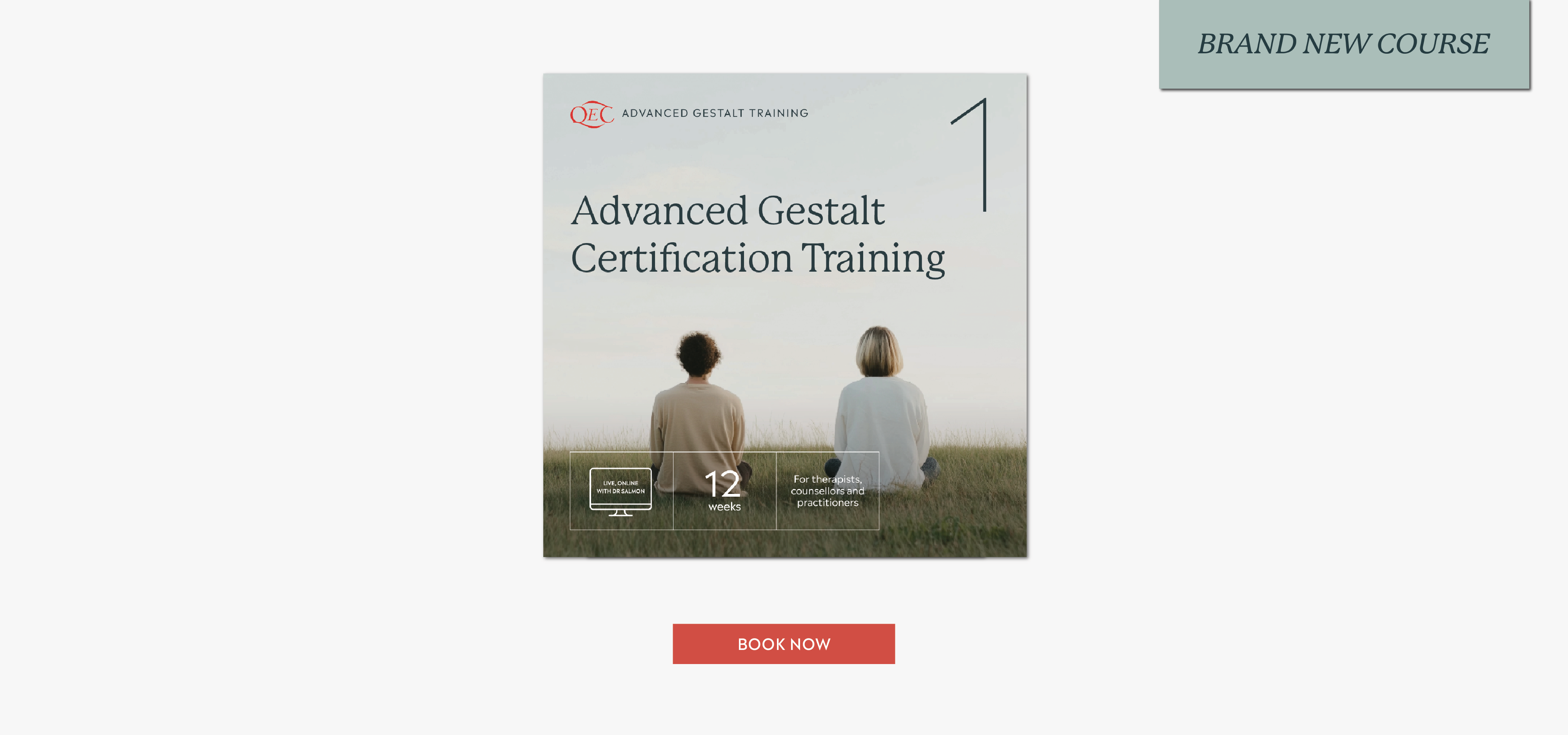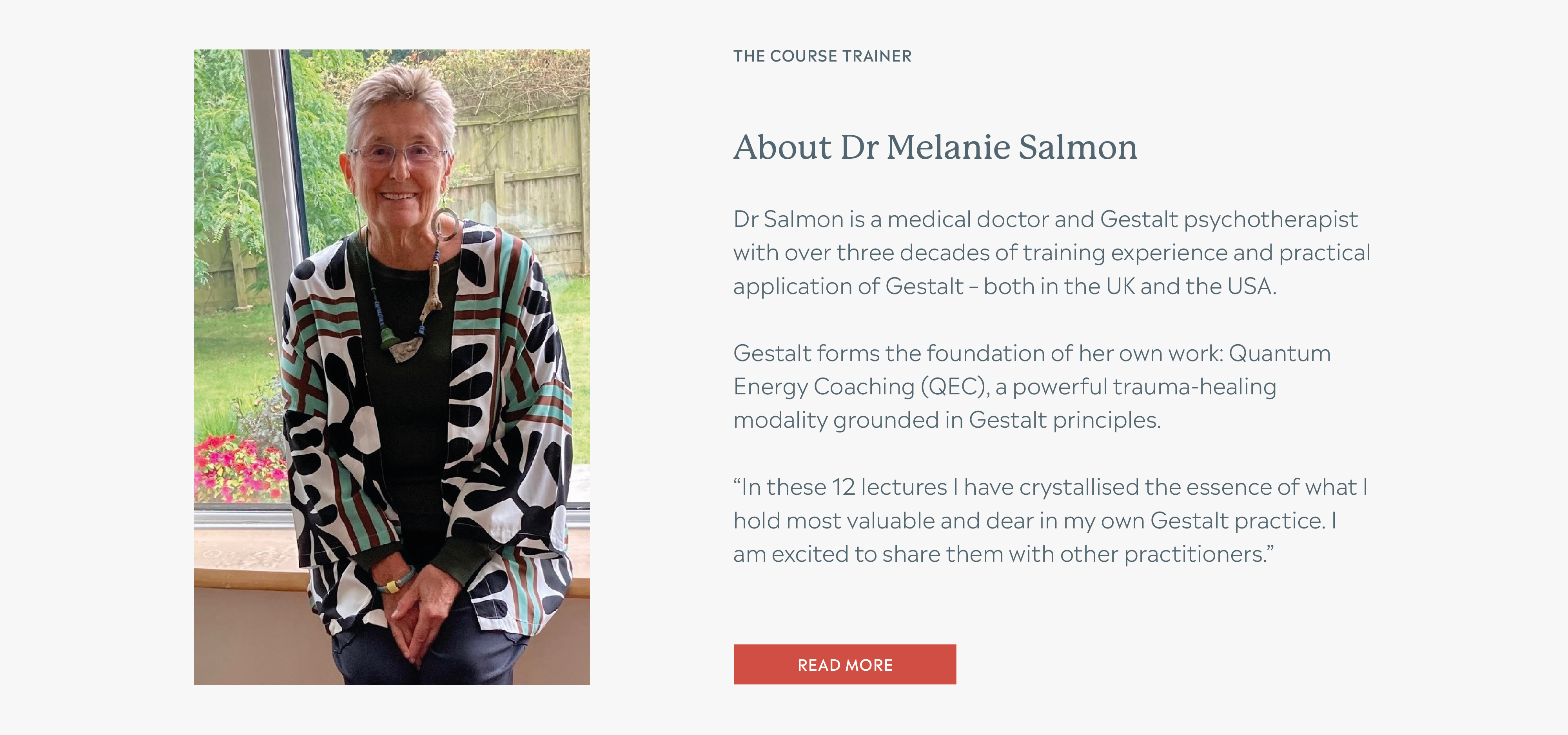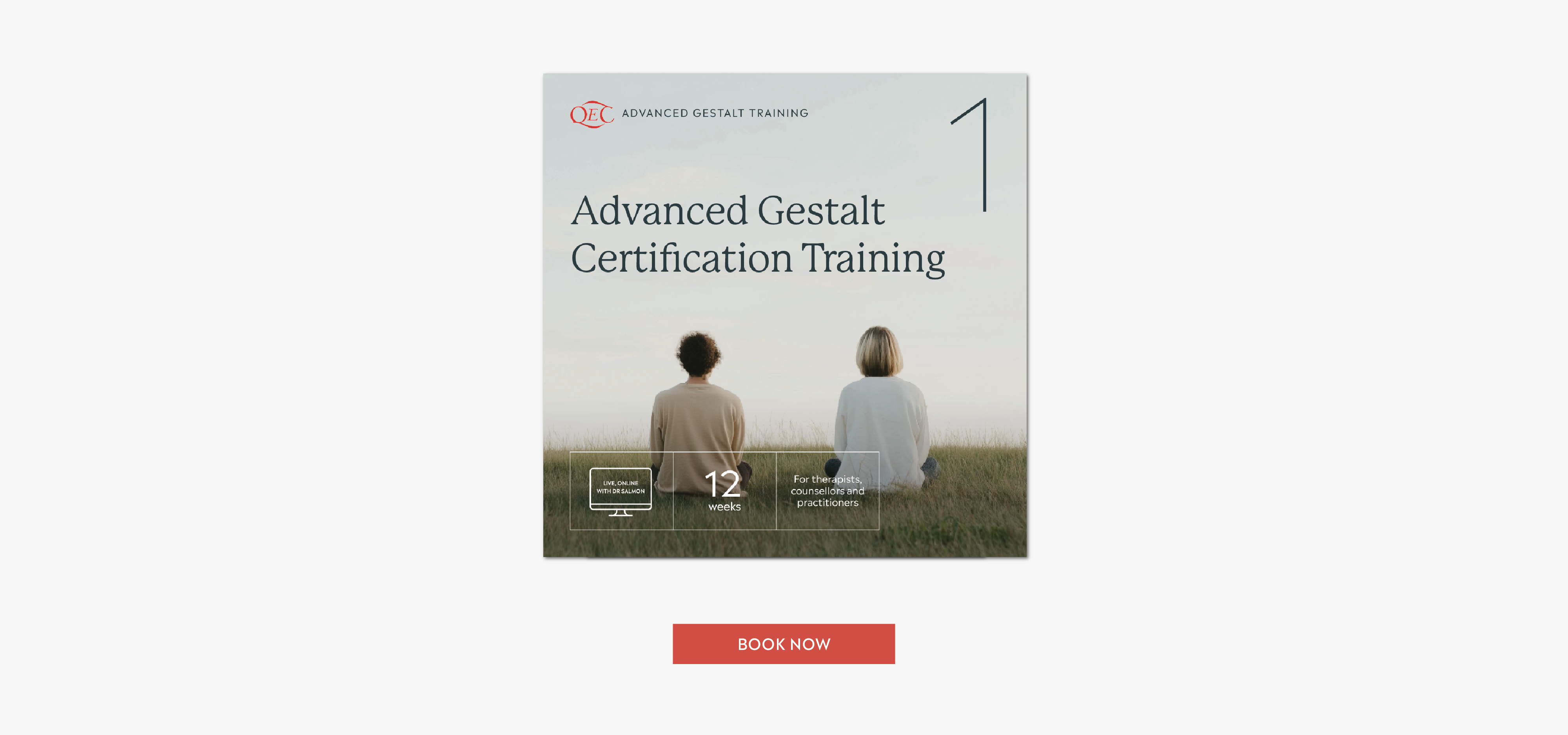“If we were to choose one key idea to stand as a symbol for the Gestalt approach, it might well be the concept of authenticity, the quest for authenticity... The therapist cannot teach what she does not know... A therapist knows within herself that she is communicating her own fears as well as her courage, her defensiveness as well as her openness, her confusion as well as her clarity.”
— Simkin and Levitsky, Gestalt Theory, 1972
The aim of Gestalt is to explore and discover our wholeness – our authenticity. We do this by raising awareness and integrating the disparate parts of ourselves, to become who we truly are.
A Gestalt I–Thou relationship, in any therapeutic setting, is sacred. It offers the optimal space for healing in those we serve. Becoming a better communicator is the aim – but it comes from the heart.
Who is eligible?
This special Gestalt Integrated Advanced Programme is designed for QEC practitioners. It is also open to others in therapeutic roles who want to deepen their own self-work and become more skilful and authentic in their practice.
Only 12 places are available on this live programme, allowing for personal work with Dr Salmon.
Certification requirements
To receive certification, participants must:
- Attend weekly live online seminars
- Practice Gestalt twice a month with an allocated peer partner
- Participate in supervision of personal work brought to live sessions
Live online weekly programme
These seminars are conducted live in a small group format over 2½ hours. The intention is to learn Gestalt by experiencing it.
Group Gestalt process work includes check-ins and check-outs, developing connection, and building trust in a safe, confidential space. As the Gestalt work unfolds, live demos will be conducted by Dr Salmon, supported by input and shared learning from the group.
In addition, twice-monthly peer practice with an allocated partner is encouraged – a vital opportunity to deepen presence, listening, and authentic relational contact.
Programme:
Seminar 1 - Introduction to Gestalt
Meet Fritz Perls, the iconoclastic originator of Gestalt. He rebelled against the analytic approach of his time, which he saw as reductionist, determinist, and over-intellectualised. He would often make provocative statements such as: “Lose your mind and come to your senses!”
In this introductory lecture, I share an overview of Gestalt and the therapeutic relationship. You will meet some of the well-known Gestalt trainers and get a sense of the healing power of this approach.
QEC Seminar 2 - The Dialogic Relationship
“Our deepest, most profound stirrings of self-appreciation, self-love and self-knowledge surface in the presence of the person whom we experience as totally accepting.” – Zinker
We will learn and witness, in practice, the Gestalt dialogic relationship. When we connect in an I–Thou sacred moment, we meet as genuine people – risking our humanity in the dialogue of the healing process by being authentic, real, and honest. It is through this genuine encounter that the client feels seen, heard, and accepted as they are, in their true state. This enables movement towards their own authenticity.
Seminar 3 - Phenomenology and Raising Awareness
The phenomenological approach seeks to understand, through enquiry, the subjective and perceptual life of a client. It is a method of exploring how clients have made meaning in their lives.
It means approaching the client with an open mind and genuine curiosity, where nothing matters but the discovery of their personal experience. In doing this, awareness of their own process and the choices they make is sharpened.
Growth occurs from real contact between real people.
Clients learn how they are seen, and how their awareness process may be limited – not primarily by talking about their problems, but by how they and the therapist engage with one another. Everything is secondary to the direct experience of both participants.
Seminar 4 - Zones of Awareness
Raising awareness is key to growth. We will look at the four zones of awareness to work through, and how – by promoting awareness – our clients' growth unfolds organically and without effort.
Included in this seminar will be teachings on common and effective interventions to raise awareness.
Seminar 5 - Wholeness, Figure & Ground, and the Gestalt Cycle
Wholeness, figure & ground, and the Gestalt cycle of healthy self-regulation will be covered in depth in this lecture. We will explore how, due to past trauma and limiting experiences, we acquire interruptions to contact in a healthy Gestalt cycle.
Our goal is the re-establishment of the healthiest level of growth, pleasure, and vitality.
“The healthy, uninterrupted flow of experience – the emergence of a need to its satisfaction – is the natural state of a healthy animal or a spontaneous young child; what we aim for when removing interruptions to our healthy cycle.” – Zinker
Seminar 6 - What is Identity and Who Am I?
Gestaltists work with the understanding that self is relational – shaped by the encounter at the contact boundary. This is how our clients develop a healthier, more functional way of being: through relationship with us, and by experiencing the difference at the contact boundary when accepted with, “I see you, I accept you as you are.”
Through our honest, non-judgemental acceptance, a client can begin to discover who they are – and who they want to be.
We will also explore ‘unhealthy’ relational contact, its impact, and how to work with it.
Seminar 7 - Our Interconnectedness and Field Theory
The hallmark of field theory, in Lewin’s words, is “looking at the total situation” – rather than breaking it down piecemeal, item by item, or variable by variable. Instead of reducing complex, interactive phenomena into separate parts, the overall picture is appreciated as a whole, with its wholistic nature fully recognised.
Everything is interconnected. Meaning arises from the total situation. In this seminar, we will explore how essential this field approach is when working with our clients.
Seminar 8 - Experimenting: An Overview
Gestalt experimenting offers a fresh perspective on situations where there is impasse or stuckness.
This might be as simple as inviting a client to shift posture, alter their tone of voice, or change their head position while speaking. Or it may be more complex – for example, a role-play in which the client enacts both sides of an internal or external conflict through animated dialogue, using two chairs.
In this seminar, we will explore the power of Gestalt experiment and witness its application in live demonstration work.
Seminar 9: Our Own Inner Polarities: War and Peace
Clients who present with a limited range of behaviours or seem rigid and fixed are often denying significant aspects of themselves. When large portions of our human experience are disowned, internal conflict arises – one part of the self-controlling or suppressing the other.
In this seminar, we will explore War and Peace as an external polarity – and reflect on how this same polarity lives within us.
Working with polarities can expand awareness and support a fuller sense of self, leading us towards inner peace.
Seminar 10 - Gestalt Dream Work
Fritz Perls described dreams as “the royal road to integration.”
His approach to dream work – for which he was widely known – viewed dreams as a gateway to receive existential messages, transmitted to the unconscious mind for integration.
In this seminar, we will explore the magic of working with metaphors, fantasy, and entering the dream world as a doorway to transformation.
Seminar 11 - Working with Shame, Gestalt Style
According to affect theorist Gershen Kaufman,
“Shame represents the most poignant experience of the self by the self.”
Whether experienced as the humiliation of cowardice or the sense of failing to meet a challenge, shame wounds us from within – dividing us from ourselves and from one another.
Shame lies at the foundation of many painful emotional states. In this session, we’ll explore how it can be transformed – into confident self-worth and deep self-acceptance.
Seminar 12 - Working with Anxiety and Depression
“How safe we feel is crucial to our physical and mental health and happiness.” – Stephen Porges
In this closing lecture, we’ll address one of the most common challenges of our time – how we work with anxiety and depression.
“Anxiety is like a rocking chair. It gives you something to do, but it doesn't get you very far.” – Zinker
We will conclude the seminar series by focusing on how we resource our clients – and ourselves.




